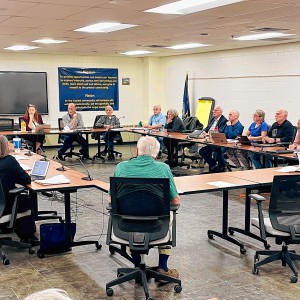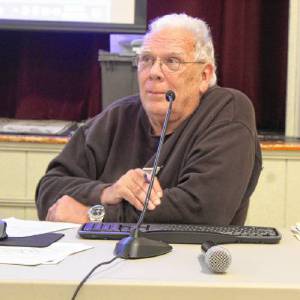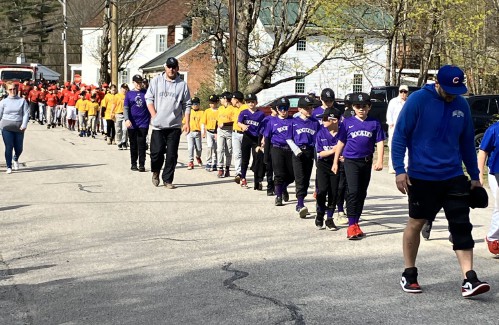Latest News
 FPU’s Mooney receives top honor
FPU’s Mooney receives top honor

Peterborough voters approve a $11.7 million bond to fund a new Fire and Rescue Station
Peterborough voters approved a bond of $11.7 million to fund the new Fire and Rescue Station by a landslide at the open session of Town Meeting Wednesday night. According to the Select Board, 90% of the 368 voters at Town Meeting approved the...

Library bench dedication honors town volunteer
Mary Anne Grant, a longtime resident of Greenfield and beloved town volunteer, was remembered Saturday with the unveiling of a stone bench in her honor in front of Stephenson Memorial Library.“For 40 years, Mary Anne watched every parade in Greenfield...
Most Read
 Peterborough voters approve a $11.7 million bond to fund a new Fire and Rescue Station
Peterborough voters approve a $11.7 million bond to fund a new Fire and Rescue Station
 ConVal’s Kimberly Rizzo Saunders named Superintendent of the Year
ConVal’s Kimberly Rizzo Saunders named Superintendent of the Year
 New look at Gregg Lake
New look at Gregg Lake
 BUSINESS: Christine Eber opens The 603 Nail Salon in Jaffrey
BUSINESS: Christine Eber opens The 603 Nail Salon in Jaffrey
 Former librarian, Jaffrey native, Cynthia Hamilton passes at 92
Former librarian, Jaffrey native, Cynthia Hamilton passes at 92
Editors Picks
 ConVal committee begins to study withdrawal process
ConVal committee begins to study withdrawal process
 HOMETOWN HEROES – Rose Novotny is motivated by community
HOMETOWN HEROES – Rose Novotny is motivated by community
 New Ipswich firefighters called on to rescue horse
New Ipswich firefighters called on to rescue horse
 Temple unlikely to hold special Town Meeting on ConVal withdrawal
Temple unlikely to hold special Town Meeting on ConVal withdrawal
Sports

ConVal girls’ lacrosse shows potential, despite record
The ConVal girls' lacrosse team didn't quite play up to their full potential against Manchester Central on Thursday, but new head coach Kevin Carne said his young team is improving every day. "They get better every game," Carne said after the 12-6...
 Mascenic baseball scores walkoff win over Wilton-Lyndeborough
Mascenic baseball scores walkoff win over Wilton-Lyndeborough
 Mt. Monadnock Little League celebrates opening day
Mt. Monadnock Little League celebrates opening day
 LOCAL SPORTS RECAP: ConVal track takes first and second
LOCAL SPORTS RECAP: ConVal track takes first and second
 ConVal track and field makes its one home meet count
ConVal track and field makes its one home meet count
Opinion

L. Phillips Runyon III – Personal freedom and the common good
We’re all disagreeing about a lot of things these days, but I hope we can still say that the three words most critical to our democracy are “We the people,” and not “I’m No. 1.” Sure, we have a Bill of Rights that guarantees the protection of...
 Robert Beck: Disturbing demographic trends
Robert Beck: Disturbing demographic trends

Business

BUSINESS: New owner brings new energy to Gaia’s Blessing
When a new owner takes over a business, one might expect changes: new products, renovations, even a new location.If that business is a metaphysical shop, like Gaia’s Blessing in Peterborough, there’s another, less-tangible change to consider -- the...
 Makaylah Parker joins Jaffrey Chamber of Commerce board
Makaylah Parker joins Jaffrey Chamber of Commerce board
 Bellows-Nichols makes donation to Hillsborough County 4-H
Bellows-Nichols makes donation to Hillsborough County 4-H
 New photography studio opens on Jaffrey Main Street
New photography studio opens on Jaffrey Main Street
Arts & Life

Participants get their displays ready for Children and the Arts in Peterborough
Around the region, hundreds of volunteers, including teachers, artists, children and parents, are getting ready for Peterborough’s Children in the Arts Festival. The festival starts in downtown Peterborough at 9 a.m. Saturday, with the grand parade...
 Town Hall Theatre in Wilton showing ‘College’
Town Hall Theatre in Wilton showing ‘College’
 Electric Earth Concerts presents Verona Quartet
Electric Earth Concerts presents Verona Quartet
 Hancock Town Library presents Hostovsky event
Hancock Town Library presents Hostovsky event
 Historical Society of Cheshire County presents ‘Mountain as Muse’
Historical Society of Cheshire County presents ‘Mountain as Muse’
Obituaries
 David Marshall Wilder
David Marshall Wilder
Peterborough, NH - David Marshall Wilder, 85, of Peterborough, Hancock, and most recently of Englewood, FL, passed away peacefully on Thursday, April 25, 2024, at the Jack Byrnes Center at Dartmouth Hitchcock Medical Center in Lebanon. ... remainder of obit for David Marshall Wilder
 Leo Thibault
Leo Thibault
Greenville NH - Leo Roger Thibault, well loved advisor and theology professor at Laboure College of Healthcare in Milton, MA died on April 24 He was 73. Born and raised in Greenville, NH, Leo was nurtured into a kind-hearted man sur... remainder of obit for Leo Thibault
 Peter Dawson
Peter Dawson
Greenville, NH - Peter passed away peacefully in his sleep from natural causes. He was 71 years old. Peter was an avid reader. He love to play a good game of chess, and could beat anyone at the game. He had a passion for collecting coi... remainder of obit for Peter Dawson
 David Irwin
David Irwin
Peterborough NH - David Ronald Irwin passed away suddenly at his family home in Beaufort, South Carolina on April 26. He was 77. A man of routine, he went that afternoon for his regular nap in his study with the dog by his side and a... remainder of obit for David Irwin

 Mascenic custodian named statewide 'Champion for Children'
Mascenic custodian named statewide 'Champion for Children'


